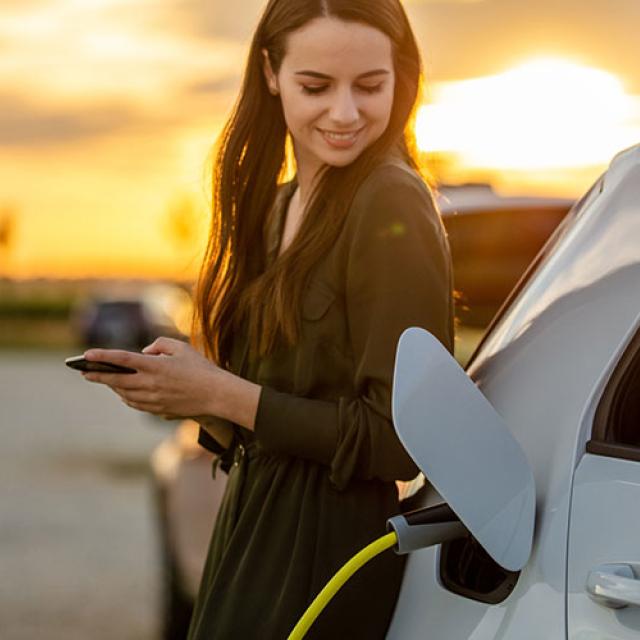Where to start with electric cars

The automobile industry is currently in the midst of one of the biggest energy transitions it has ever known. Starting in 2035, Canada and many other countries will ban sales of vehicles powered by a combustion engine. The market will have to adapt, and certain manufacturers are already forging boldly ahead to introduce new electric cars to the market. What does that mean for consumers? Where to start? Read on to learn more.
Although statistics tend to show that transportation electrification can help us collectively reduce our greenhouse gas emissions—the key factor driving climate change—consumers are primarily drawn to electric cars for their low operating costs and the peace of mind they provide.
Good for the planet and your pocket
While some people choose to buy electric for environmental reasons, many others have the economic advantages top of mind. Over the long term, lower energy costs mean it can work out cheaper to own an electric car.
On average, it costs under $5 to charge an electric car using an at-home charging station. And your fully charged battery will give you a range of about 400 km. That's a much better deal than today’s gas prices. Even at a public quick-charge station, it will only cost you $12 or so to charge your battery to 80%. That works out to about the same price as 1 litre of gas per 100 km.
Then there are the much lower maintenance costs due to the absence of mechanical components found in combustion engines. No more oil changes and cooling system checks! Electric models have far fewer mechanical parts than regular cars. Even the brakes typically last longer thanks to the regenerative braking system that sends energy to the battery as it slows the car!
Hybrid, plug-in hybrid, or all-electric?
It's not unusual to have questions about the various types of electric vehicles. What’s the difference between a hybrid, a plug-in hybrid, and an all-electric?
Basically, only an all-electric car completely eliminates the need for a combustion engine, meaning it doesn’t use any gas at all. A hybrid is a combustion/electric combination, but it uses mostly gas. Hybrids cannot run solely on electricity (except for a very short time at a very low speed). Their electric motors are primarily designed to reduce fuel consumption. They don’t need to be plugged in.
On the other hand, plug-in hybrids can run solely on electricity over a certain distance. After they’ve been plugged in and fully charged, their all-electric range usually maxes out at 75 km. Once the battery is empty, plug-in hybrids work the same way hybrids do.
Hybrids and plug-in hybrids appeal to consumers who regularly travel long distances because they don’t have to rely on public charging stations to keep going. Yet a number of factors are causing people to seriously consider all-electric cars. Range is increasing steadily year after year, prices are going down, there are more and more public charging stations, and charging times are shorter.
Generous rebates to get you on the road
There’s no denying that the price of a new electric car is still high. Prices will eventually come down once electric becomes the norm. But in the meantime, Québec residents are fortunate to have access to generous discounts and rebates that can save buyers as much as $12,000, depending on the model and subject to certain conditions.
Consumers can also get up to $600 towards the cost of buying and installing a home charging station, also subject to certain conditions. In some cases, these incentives may even make an all-electric car more affordable than a gas, hybrid, or plug-in hybrid model.
Check out the Government of Québec’s Roulez vert program to see the financial assistance you might be eligible for.
Also keep in mind that most dealers will sell and install home charging stations. Some will even roll the cost into your monthly car payment.
Higher insurance premiums?
According to rumours circulating online, electric cars cost more to insure than their gas-powered equivalents because the battery is expensive to replace. It’s true that the cost of a replacement battery is high for now, but the price will fall quickly as electric cars become more common. And remember, these batteries have a life expectancy of 8 to 10 years.
Rumours aside, electric cars are not necessarily more expensive to insure than combustion models. Because electric cars have fewer mechanical components, repair costs can be lower, and that can reduce the cost of insurance premiums. Some insurers even offer discounts on premiums for drivers of all-electric or plug-in hybrid cars.
Of course, other factors such as the price and model year of the vehicle, your driving record, what you use your vehicle for, mileage driven, and where you live affect your insurance premium. What’s more, long waits for parts and the complexity of what needs to be done can result in additional costs at the garage.
Do your homework before you buy
There are many advantages to driving an electric car in Québec: clean, renewable, and affordable hydroelectricity; discounts and rebates when you buy or lease a vehicle; and a network of public charging stations that is one of the biggest in North America. But before you buy, take the time to research different models based on what you need and contact your damage insurance representative to find out how your new ride will affect your home and auto insurance.




